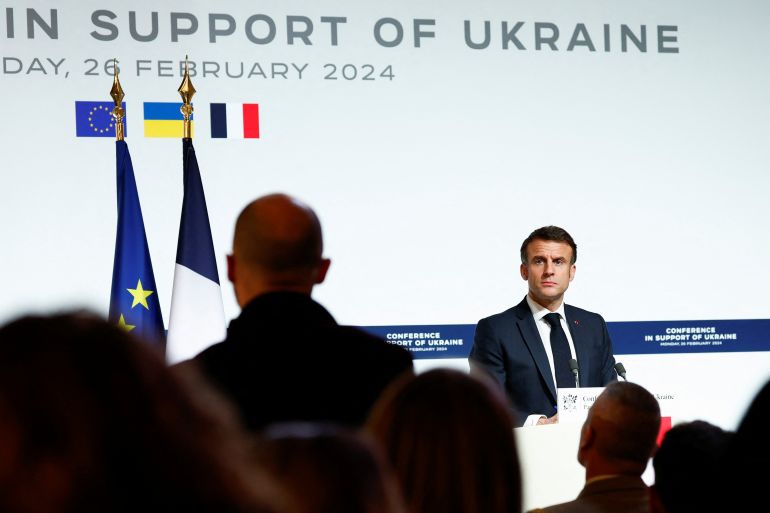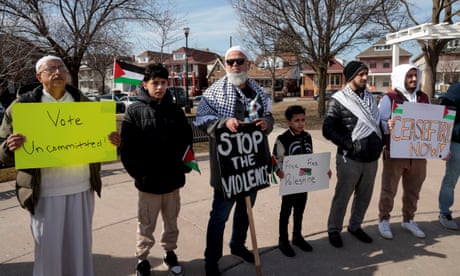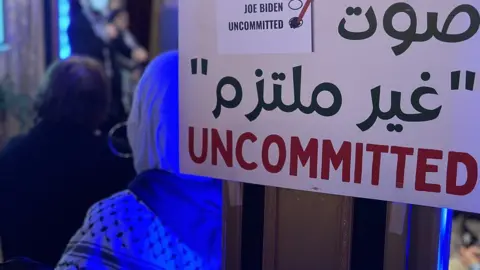WW3.0
Macron's musings about ground troops send Ukraine's allies running for cover
The French president may have been trying to signal resolve — If so, he failed

If it were any other time — and if the stakes weren't so high — the swift international slapdown that followed French President Emmanuel Macron's recent comments on Ukraine might have been funny.
On Monday, Macron refused to rule out sending ground troops to Ukraine. The words were barely out of his mouth before startled allies and leaders around the globe started to wind them back, pour cold water on them and even refute them outright.
The speed with which nations lined up to have a crack at Macron was jaw-dropping. It was left to France's defence minister, Sébastien Lecornu, to reframe what his boss had said by referring to discussions among allies about sending soldiers to carry out demining and military training in Ukraine — well away from the front lines.
"It's not sending troops to wage war against Russia," Lecornu said.
As if that would please Moscow any better.
The idea of dispatching western troops to Ukraine in any capacity has been unthinkable since the onset of major hostilities two years ago. NATO has made it quite clear it means to avoid being dragged into a wider war with nuclear-armed Russia.
Macron's comments were interesting in part because he wasn't talking about an alliance-wide initiative (which would require consensus among all 31 members) but rather an individual bilateral initiative of the sort that's used to help train and arm Ukraine's military.
Even so, Germany, Poland, the Czech Republic, Slovakia and even the United States swiftly disavowed his idea.
Canada's response was a little muddled by comparison. Deputy Prime Minister Chrystia Freeland avoided directly refuting Macron's suggestion on Tuesday. It was left to a spokesperson for Defence Minister Bill Blair to articulate the country's position.
"We will continue to provide Ukraine with comprehensive military assistance, but as a NATO member, Canada has no plans to deploy combat troops to Ukraine," said Diana Ebadi.
Both Freeland and Ebadi pointed to the security assurance package signed by Prime Minister Justin Trudeau and Ukrainian President Volodymyr Zelenskyy last weekend. It includes a clause stating that where military training is concerned, Canadian troops would return "to conduct associated activities in Ukraine when conditions permit."
Ukraine has been trying to entice allies to resume troop training within its borders. It's been sending its recruits and soldiers to the United Kingdom and Poland, where the bulk of the instruction has taken place.
It is safe to say that, with Ukraine on the defensive and the Russian army building up for a late spring or early summer theater-wide offensive, "conditions" are not right for the Canadian government to take such a provocative step, even if that was truly France's intention.
The news along the front in eastern Ukraine is growing more concerning by the day, with Russia recently making confirmed advances near Kreminna, Bakhmut and Avdiivka, according to the Washington-based Institute for the Study of War.
Zelenskyy said this week that Moscow is preparing a new offensive that will start in late May or June. He said the Ukrainian military has a clear plan to counter that push.
Andrew Rasiulis, a former senior official at the Department of National Defence (DND) who once ran the department's Directorate of Nuclear and Arms Control Policy, said Macron's comments are a sign of "deep concern" among European leaders about what's coming.
"The war is not going well for the Ukrainians. That's a fact. And so, people are getting nervous," said Rasiulis, a fellow at the Canadian Global Affairs Institute.
He described Macron's remarks as nothing more than "musings" that seem to overlook the full consequences — because deploying forces "essentially means going to war."
The Kremlin, in response, was swift to warn that any deployment of western troops would lead to a direct confrontation between NATO and Russia.
"In this case, we need to talk not about probability, but about the inevitability (of conflict)," Kremlin spokesperson Dmitry Peskov told reporters.
Matthew Schmidt, a national security and eastern European expert at the University of New Haven in Connecticut, said Macron's remarks could have been an attempt at a display of resolve for Russian President Vladimir Putin's benefit. If so, they appear to have backfired.
Schmidt said it's a remarkable about-face for a French president who, earlier in the war, pushed for negotiations and infamously insisted that Russia deserved security guarantees.
"The question I have is the timing," said Schmidt. "Everybody else in Europe is saying maybe it's time to, you know, look at negotiations, at least by the end of this year. Nobody is really doubling down at this point."
Politically, Schmidt said, it may be that Macron wants to establish France as the leader of the alliance's European side in light of wavering in the U.S. Congress.
"I think Macron saying what he did might be more in the interest of Macron than in the interest of France," he said.
Kremlin Warns of Escalation if NATO Troops Fight in Ukraine
- French President Macron's comments at a summit in Paris suggest a willingness to support Ukraine with military aid, including the possibility of sending Western troops, prompting a warning from the Kremlin about the risk of war with NATO.
- Despite Macron's remarks, several European NATO members, including Germany and Poland, reject the idea of sending troops to Ukraine, emphasizing support through other means such as supplying advanced weaponry and ammunition.
- NATO chief Jens Stoltenberg reaffirms that there are no plans for NATO combat troops on the ground in Ukraine, but stresses unprecedented support provided to Ukraine by allies.
The Kremlin has warned Kyiv's European allies that sending troops to fight in Ukraine would lead to the "inevitability" of war between Russia and NATO after France said that, despite a current lack of consensus, "nothing," including sending Western forces to fight on the Ukrainians' side, should be ruled out in terms of preventing a Russian victory in Ukraine.
Speaking after a summit of continental leaders in Paris on February 26, French President Emmanuel Macron said there was a "broad consensus to do more and quicker" for Ukraine as participants agreed to create a coalition to supply Ukraine with medium- and long-range missiles and bombs to back Kyiv's efforts to stave off Russia's invasion.
Macron told a news conference that "no consensus" existed on the sending of European ground troops to Ukraine, but added, "nothing should be excluded to achieve our objective. Russia cannot win that war."
Asked about Macron's remark, Kremlin spokesman Dmitry Peskov said on February 27 that "the very fact of discussing the possibility of sending certain contingents to Ukraine from NATO countries is a very important new element."
"We would need to talk not about the probability, but about the inevitability [of a direct conflict between Russian and NATO]," Peskov said.
Several European NATO members on February 27 rejected the possibility of sending troops into Ukraine.
"What was agreed from the beginning among ourselves and with each other also applies to the future, namely that there will be no soldiers on Ukrainian soil sent there by European states or NATO states," German Chancellor Olaf Scholz, who attended the Paris gathering, told journalists.
In Prague, Czech Prime Minister Petr Fiala and his visiting Polish counterpart, Donald Tusk, said their governments were not contemplating such a move.
"I am convinced that we should develop the paths of support that we embarked on after Russia's aggression," Fiala told a news conference alongside Tusk.
"I believe we don't need to open some other methods or ways," he added.
"Poland does not plan to send its troops to the territory of Ukraine," Tusk said.
NATO chief Jens Stoltenberg told the Associated Press on February 27 that “NATO allies are providing unprecedented support to Ukraine. We have done that since 2014 and stepped up after the full-scale invasion. But there are no plans for NATO combat troops on the ground in Ukraine.”
The Paris gathering was also attended by Polish President Andrzej Duda, and leaders from the Baltic nations, while the United States was represented by its top diplomat for Europe, James O’Brien, and Britain sent Foreign Secretary David Cameron.
Zelenskiy, who addressed the summit via video link, called on European leaders to ensure that Russian President Vladimir Putin "cannot destroy our achievements and cannot expand his aggression to other nations.”
Ukraine relies heavily on advanced weaponry and ammunition supplies from its Western allies, mainly from the United States, to resist increasingly intense assaults by Russian forces who have superiority in manpower and a large supply of ammunition.
Outgunned and outmanned Ukrainian troops have been recently forced to withdraw from some of their defensive positions in the east as a critical U.S. military aid package worth $61 billion remains blocked in the Republican-led House of Representatives.
Europe will help Ukraine "to take the initiative and act together at a time when there is uncertainty on the part of the United States regarding aid," Macron said
Participants to the gathering said there was increasing support from European countries, including France, for a Czech initiative to buy ammunition and shells outside the EU and send them to Ukraine.
Dutch Prime Minister Mark Rutte said the Netherlands was willing to provide more than 100 million euros for that purpose.
By RFE/RL
Germany, NATO rule out sending troops to Ukraine as Russia rebukes Macron
Rebuttal of Macron’s remarks comes as Kremlin warns of conflict if West puts boots on ground in Ukraine.
Published On 27 Feb 2024
Germany, Poland and NATO have ruled out sending ground troops to Ukraine, as the Kremlin warned such a move would mark a major escalation and result in direct conflict between Russia and the Western security alliance.
The statements on Tuesday came a day after French President Emmanuel Macron raised the prospect following a European leaders’ meeting on boosting support for Ukraine in its war against Russia.
German Chancellor Olaf Scholz said participants of the conference in Paris discussed the matter but had agreed “that there will be no ground troops, no soldiers on Ukrainian soil who are sent there by European states or NATO states”.
Scholz said there was also consensus “that soldiers operating in our countries also are not participating actively in the war themselves”.
Polish Prime Minister Donald Tusk and Czech Prime Minister Petr Fiala – two of Kyiv’s strongest supporters – meanwhile said they too were not considering sending troops.
NATO Secretary-General Jens Stoltenberg also told The Associated Press news agency that while members of the alliance had provided “unprecedented support” to Ukraine, “there are no plans for NATO combat troops on the ground in Ukraine”.
The idea of sending troops has been taboo, particularly as NATO seeks to avoid being dragged into a wider war with nuclear-armed Russia. Nothing prevents NATO members from joining such an undertaking individually or in groups, but the organisation would get involved only if all 31 members agreed.
The Kremlin, meanwhile, warned that a direct conflict between NATO and Russia would be inevitable if the alliance sent combat troops.
“The very fact of discussing the possibility of sending certain contingents to Ukraine from NATO countries is a very important new element,” Kremlin spokesperson Dmitry Peskov told reporters, commenting on Macron’s remarks.
It is “absolutely not in the interests” of European members of NATO, Peskov said. “In that case, we would need to talk not about the probability, but about the inevitability [of direct conflict].\
With Macron increasingly looking isolated, his government subsequently sought to clarify his comments.
French Foreign Minister Stephane Sejourne said on Tuesday the president had in mind sending troops for specific tasks such as helping with mine clearance, production of weapons on site, and cyber-defence.
“[This] could require a [military] presence on Ukrainian territory, without crossing the threshold of fighting,” Sejourne told French lawmakers.
“It’s not sending troops to wage war against Russia,” the minister said.
The conference in Paris was held just after France, Germany and the UK each signed 10-year bilateral security agreements with Ukraine as its government works to shore up Western support.






 A polling site at the University of Michigan on Tuesday. Many students across the state were on spring break and not on campus.Credit...Brittany Greeson for The New York Times
A polling site at the University of Michigan on Tuesday. Many students across the state were on spring break and not on campus.Credit...Brittany Greeson for The New York Times








